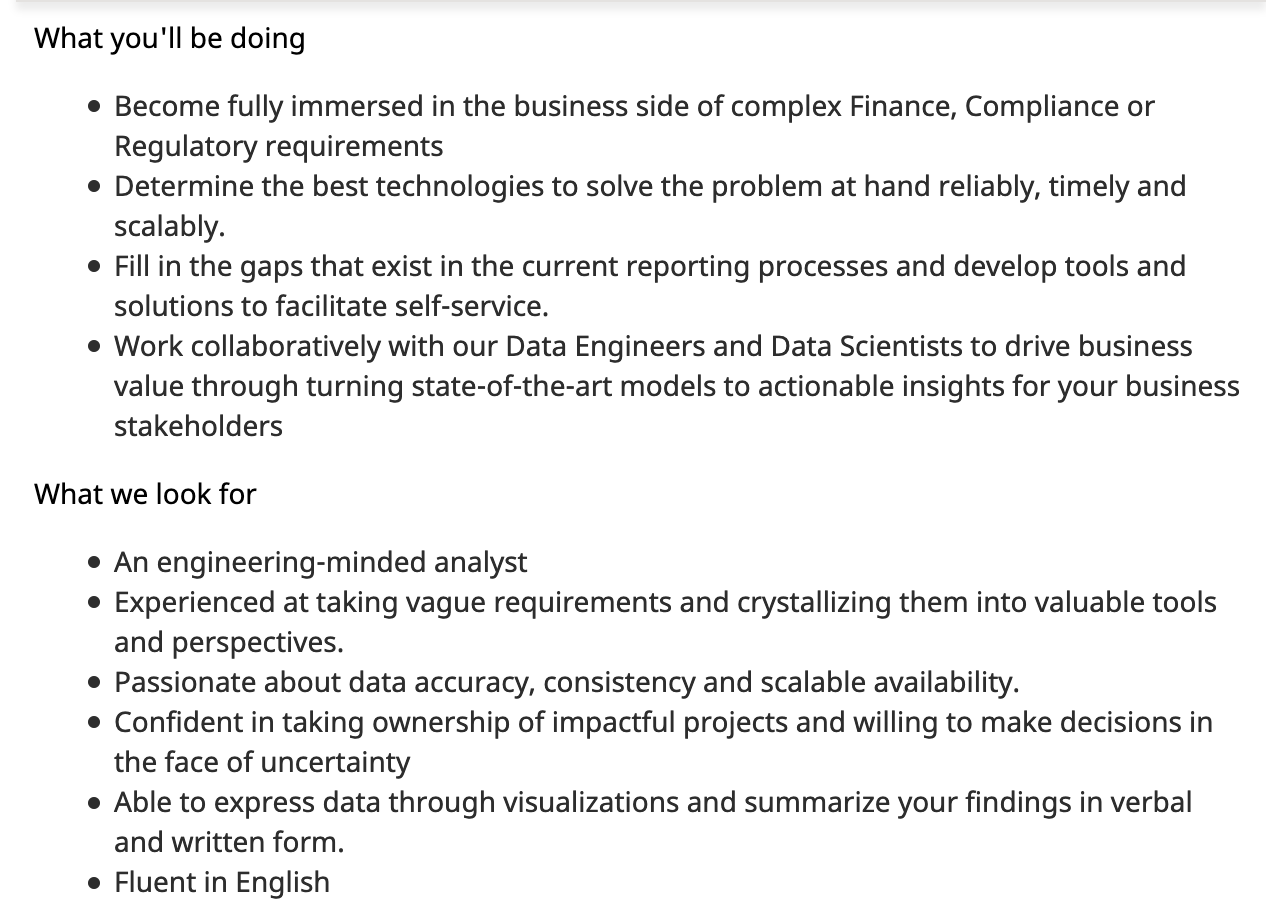So You Want To Find an Analytics Engineering Job?
Looking for an analytics engineering job in your locale? Read this.

Shortly before writing last week’s blog post What We Know and Don't Know About Analytics Engineering, I did a quick search for ‘analytics engineer’ on the job portal Indeed.com, scoped to the Asia Pacific region.
I found absolutely zero listings.
To be up-front, I did find one listing, but it was for a data engineering role — that is, the type of job where you’re expected to set up and maintain ETL pipelines and manage databases. It just so happened to say ‘data analytics engineer’ in the job title.
Of course, Indeed.com didn’t leave me with a blank screen — it populated my search results with any listing with the word ‘analytics’ and ‘engineer’ in it. The majority of those jobs were more traditional data analyst roles. These job listings included descriptions like:
- Minimum 3 years of work experience, as product analyst or in a highly analytical role in ecommerce / tech B2C product-based firms.
- Experience in working with large databases and query via SQL and scripting language (Python)
- Knowledge of statistical analysis, quantitative modelling, forecasting skills
- Working experience with BI tools (Power BI, Tableau, QlikView, Datastudio, etc)
- Experience in identifying opportunities for business or product improvement and defining and measuring the success of those initiatives.
- Experience with stakeholder management
And so on.
I repeated my search across a couple of other locales. New York and California returned a good selection of Analytics Engineering roles, exactly the type of listings that you want if you’re looking to get into analytics engineering as a discipline; to my surprise, when I repeated my search for Indeed’s Berlin site, I found a handful of roles with both the right name and the right description.
What do I mean by this? Well, take, for instance, ‘Analytics Engineer - Data Platform’ from Trade Republic Bank GmbH. This is a listing with the right name, but with a description that doesn’t seem quite right for an ‘analytics engineer’. In fact, I’d say the odds are good that this is a traditional data analyst job in disguise.

But unlike my Asia Pacific search, Berlin did have a number of properly named analytics engineering roles. This listing from On AG for instance (yes, the shoe company) seems like a particularly good candidate: the job description states that it wants people with ‘experience with modern data stack tools (we use BigQuery, dbt and Looker)’ — which increases the odds a fair bit.


Search for Stacks, Not Titles
So what does this tell us? It tells us how much ‘analytics engineering’ as an idea has spread. Right now, it doesn’t seem to have spread very far, and job seekers who aren’t in global tech centers and who want to get into this nascent field would do better to look for other indicators.
What other indicators?
Out of curiosity, I ran a search for ‘dbt’ for the APAC region, as part of the research for this post. The results of that was slightly better: I found two jobs in South East Asia, and both seemed like exactly the sort of role that Michael Kaminsky, Claire Carroll and Paul Glenn would call analytics engineering:
- Director of Product Analytics, APAC, at foodpanda Philippines, which says ‘Experienced in implementing modern analytics tools and technologies across the stack: Data Warehousing (Big Query, Redshift, Snowflake, etc.), Data Engineering (Airflow, Dragster, Fivetran, dbt, etc.), and Data Visualization (Tableau, Looker, Mode, etc.)’. This bodes well for not just this role, but also the entire product analytics team at foodpanda.
- Machine Learning Engineer at Sephora, which mentions that their data models and shared feature sets are managed in dbt + BigQuery.
To be fair, many job titles in the data space are messed up — I’ve known data engineers who were effectively data analysts, data scientists who functioned as analysts, and machine learning engineers who were effectively data scientists.
(But what does ‘data scientist’ actually mean? Well, perhaps we just don’t know.)
And so it’s understandable that ‘analytics engineer’ — as a job title — isn’t as common in the rest of the world. When we published our post on analytics engineering last week, a number of readers reached out to us and said one of two things: either that they didn’t know that such a role existed, or they reacted by questioning the definitions that we laid out.
I thought that was interesting. I also thought it was interesting that a number of those readers were from the US. It’s still early days for the ‘movement’, indeed.
What’s the actionable takeaway here? The takeway is this: if you’re a data analyst and you want to get into analytics engineering, searching for specific tools on job sites seem like a better way to find relevant jobs right now. Look for companies that use columnar data warehouses like BigQuery or Redshift, along with a data modeling tool like dbt or Dataform, coupled with something like Looker or Mode or Holistics (ahem) or Redash or Superset, with connectors from Stitch Data or Fivetran. Companies that use modern tools are more likely to hire you for analytics engineering-type work. Adjust your search accordingly.
Of course, this suggests a corollary: if you want to track the adoption of analytics engineering in your particular job market, set up an email notification for jobs with the word ‘dbt’ or ‘Fivetran’ in the listing description.
That should be a pretty good proxy for adoption, I think. And it might be a useful leading indicator in your career.
Notes
- I used Indeed.com for this post because I wanted a global jobs database to compare searches on. There are better, more localised tech job sites for each of the countries in South East Asia; it is entirely possible that I would have gotten better results searching there.
- One conclusion that falls out of this is that analytics engineering is very much a US-centric thing right now. The vendors who are pushing for it are trying to make it a global trend, but we’re still early on the adoption curve. I should note that we’re doubly aware of this at Holistics, given that we’re based out of Singapore and Vietnam, and we serve customers from all over the world. In Vietnam, for instance, data science only became hot a couple of years ago — whereas to most tech industry people in the West it seems like such an old fad. ‘Analytics engineering’, as a thing, is probably going to become a trend on very different time scales, depending on whether you’re in Singapore or New Zealand or Austria or Vietnam. That’s going to matter a great deal at the level of the individual data career.
- Finally, and I suppose I should say this for completeness: one response to this whole “let's find a job in ‘analytics engineering’ because it's good for one's career” is that it misses the point entirely. You want to go to where the cutting edge is, and one such edge in data appears to be at Chinese companies like Bytedance. (See: Chip Huyen's post, Eugene Yan's response, and Eugene Wei's argument about the ascendancy of ML-driven Chinese companies). It is entirely plausible that one valid path is to go work at, say, Bytedance's Singapore office and learn everything you can there; whatever you learn about production ML is likely to be valuable to you for the rest of your data career.
What's happening in the BI world?
Join 30k+ people to get insights from BI practitioners around the globe. In your inbox. Every week. Learn more
No spam, ever. We respect your email privacy. Unsubscribe anytime.

